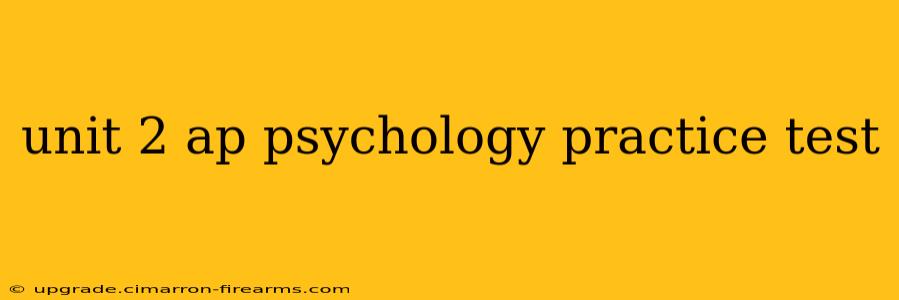This comprehensive practice test covers Unit 2 of the AP Psychology curriculum, focusing on research methods. It's designed to help you assess your understanding of key concepts and prepare for the AP exam. Remember to thoroughly review your notes and textbook before attempting this test.
Section 1: Multiple Choice
Instructions: Choose the best answer for each multiple-choice question.
-
Which of the following is NOT a descriptive research method? a) Case study b) Naturalistic observation c) Survey d) Experiment
-
A researcher wants to study the effect of caffeine on alertness. What is the independent variable? a) Alertness b) Caffeine c) The participants d) The time of day
-
What is a confounding variable? a) A variable that is kept constant throughout the experiment. b) A variable that the researcher is interested in measuring. c) A variable that unintentionally influences the dependent variable. d) A variable that is manipulated by the researcher.
-
A researcher uses a random sample to select participants for a study. What is the primary benefit of using a random sample? a) It ensures that the sample is representative of the population. b) It eliminates the need for a control group. c) It guarantees that the results will be statistically significant. d) It simplifies data analysis.
-
What is the purpose of operational definitions in research? a) To ensure that variables are clearly defined and measurable. b) To increase the sample size of the study. c) To eliminate confounding variables. d) To improve the statistical significance of the results.
-
Which research design allows researchers to infer cause-and-effect relationships? a) Correlational study b) Case study c) Experiment d) Naturalistic observation
-
A correlation coefficient of -0.8 indicates: a) A strong positive correlation. b) A weak negative correlation. c) A strong negative correlation. d) No correlation.
-
The ethical principle of informed consent means that participants: a) Are debriefed after the study is completed. b) Are aware of the purpose and procedures of the study. c) Are randomly assigned to groups. d) Are guaranteed confidentiality.
-
What is the purpose of a control group in an experiment? a) To manipulate the independent variable. b) To provide a baseline for comparison. c) To ensure that the results are statistically significant. d) To reduce the impact of confounding variables.
-
What is a meta-analysis? a) A type of descriptive research. b) A statistical analysis of multiple studies on the same topic. c) A research method that uses deception. d) A qualitative research method.
Section 2: Short Answer
Instructions: Answer the following questions in complete sentences.
-
Explain the difference between random sampling and random assignment.
-
Describe the ethical considerations researchers must address when conducting psychological research.
-
Explain the strengths and weaknesses of case studies as a research method.
Section 3: Essay
Instructions: Write a well-organized essay addressing the following prompt.
Explain the importance of operational definitions in experimental research. Provide specific examples to illustrate how poorly defined variables can lead to inaccurate or misleading results. Discuss the role of control groups and random assignment in minimizing the impact of confounding variables and ensuring the validity of experimental findings.
Answer Key (Multiple Choice): 1. d), 2. b), 3. c), 4. a), 5. a), 6. c), 7. c), 8. b), 9. b), 10. b)
This practice test provides a solid foundation for reviewing Unit 2. Remember to consult your textbook and class notes for further clarification on any concepts you find challenging. Good luck with your studies!

